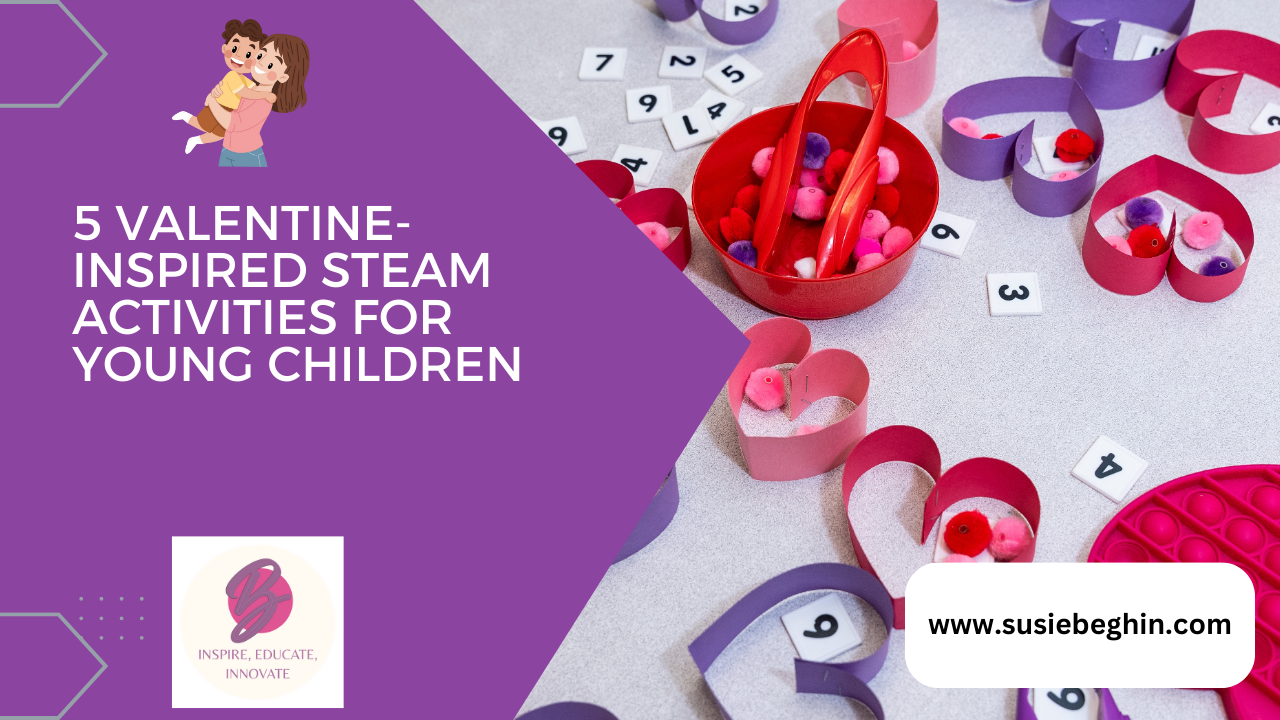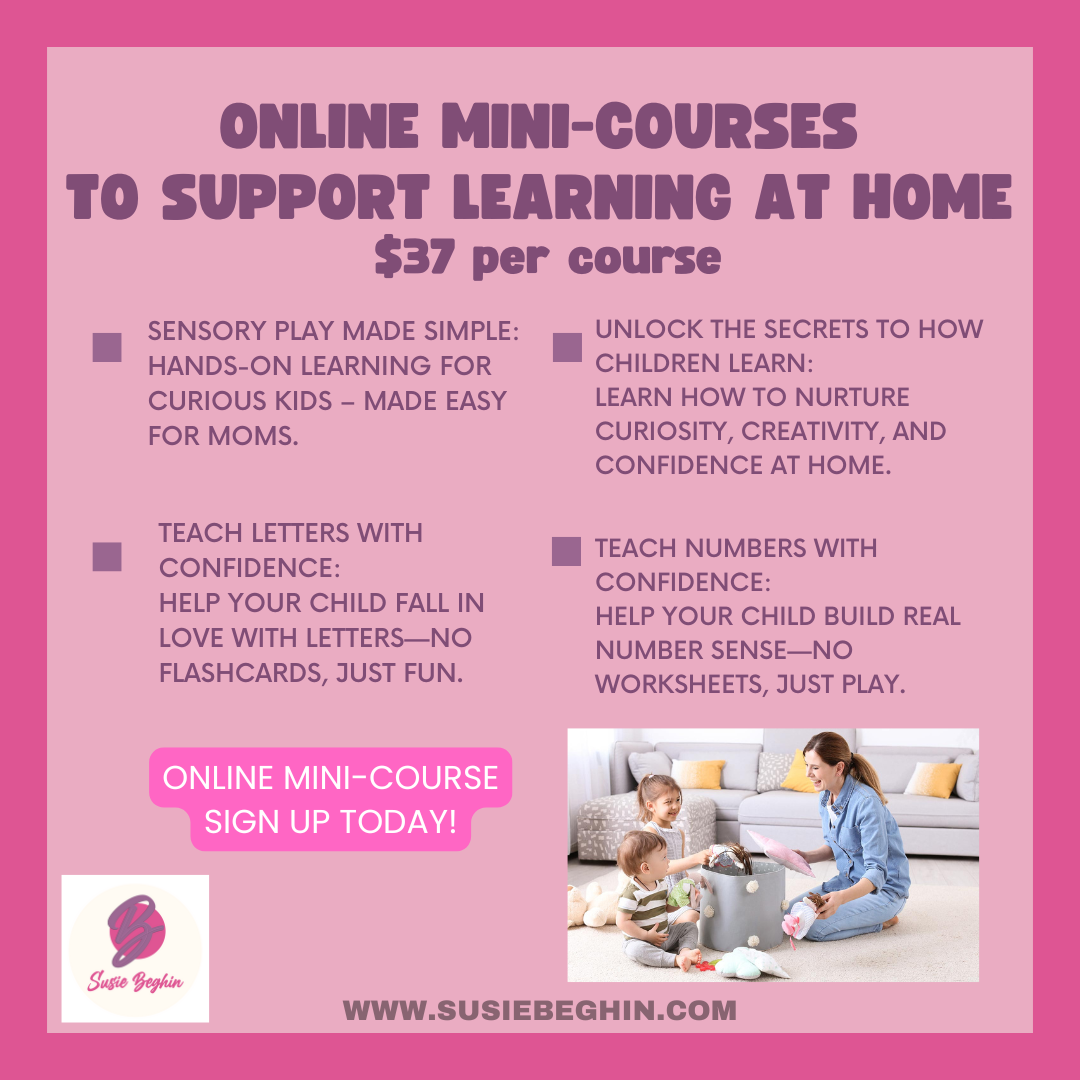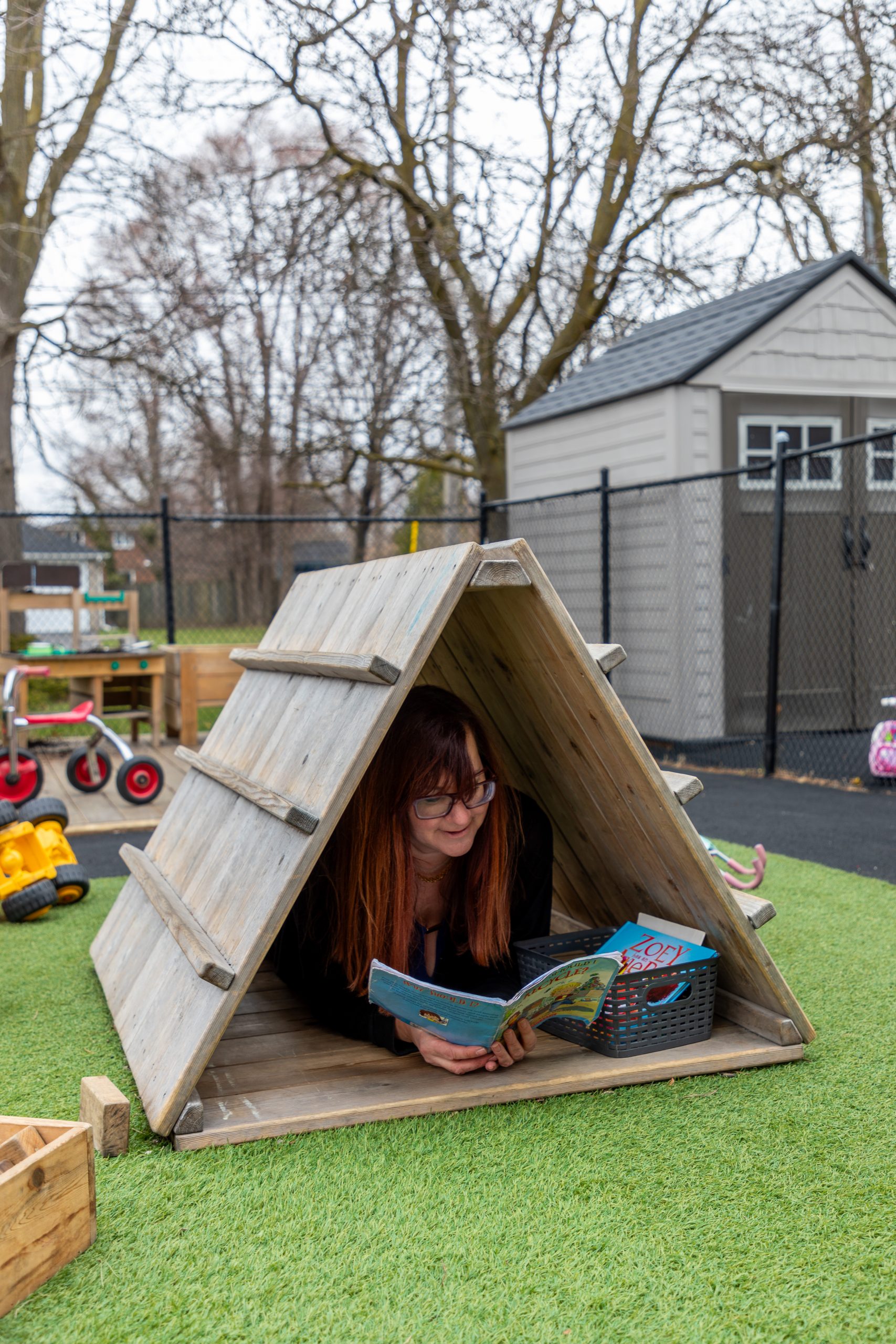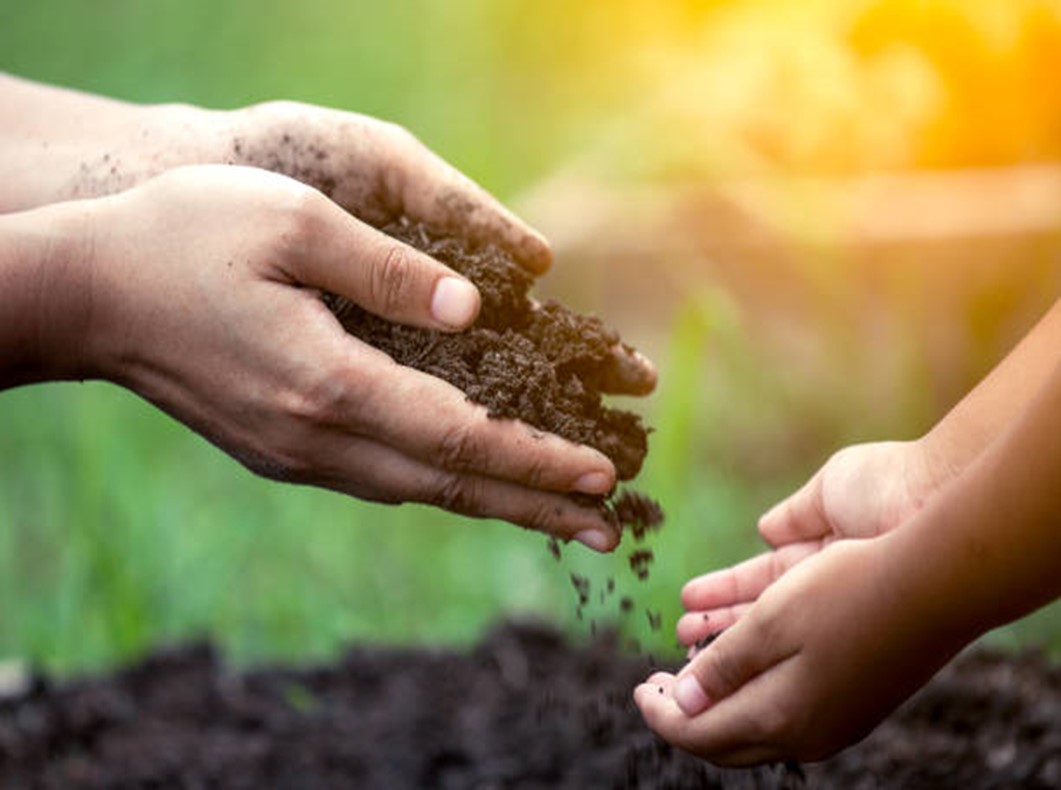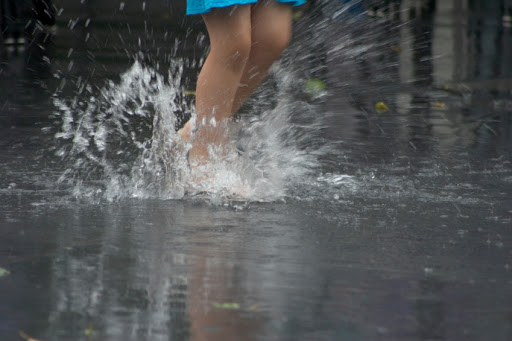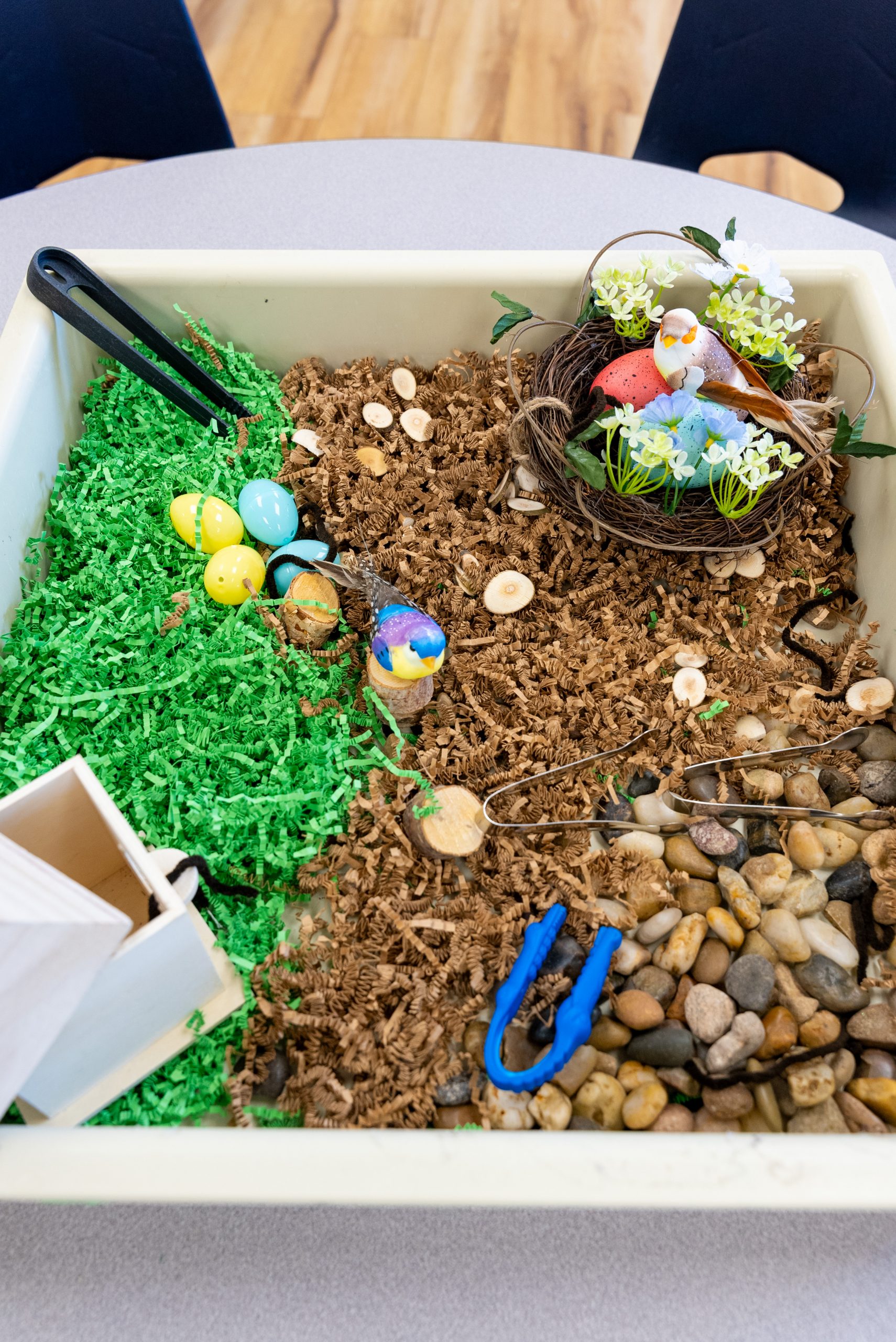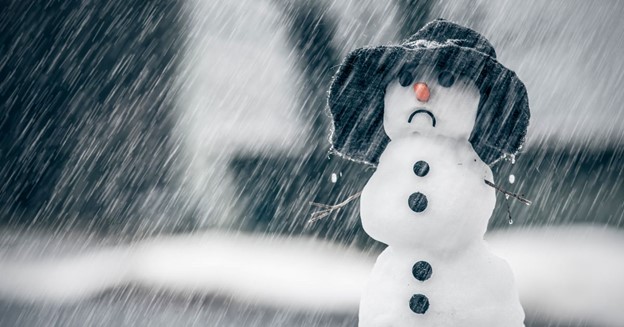5 Valentine-Inspired STEAM Activities for Young Children
💕 5 Valentine-Inspired STEAM Activities for Young Children
Valentine’s Day is the perfect opportunity to bring a little extra joy, colour, and curiosity into early learning. These five Valentine-inspired STEAM activities combine science, literacy, engineering, math, and art in ways that feel playful, hands-on, and developmentally meaningful.
Because learning doesn’t need to be quiet, seated, or worksheet-based—it can be active, joyful, and full of discovery.
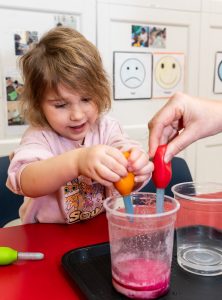
💫 1. Valentine Love Potion (Science)
At the science table, children created a Valentine love potion by mixing red-tinted baking soda and vinegar. The fizzing and bubbling sparked instant excitement and curiosity.
As they experimented, children explored:
- Cause and effect
- Early science concepts
- Fine motor skills
All through hands-on play and natural investigation. Simple materials + big reactions = powerful learning.

💖 2. Valentine Literacy: Letter Heart Hunt
Literacy came to life with a letter heart hunt, where children searched for and matched letters displayed on a large sheet of paper.
This active literacy experience supported:
- Letter recognition
- Gross motor movement
- Early reading foundations
Literacy doesn’t have to happen at a table—when children move their bodies, learning sticks in a whole new way.
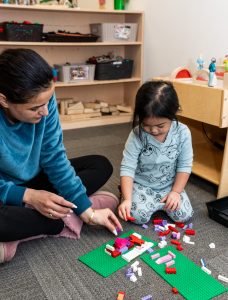
🧱 3. Engineering with a Valentine Twist
In the engineering area, Valentine-coloured LEGO® inspired creativity, problem-solving, and big ideas.
As children built, balanced, and redesigned their structures, they strengthened:
- Spatial awareness
- Persistence
- Early engineering and design skills
Learning happens best when children are free to create, explore, and try again.
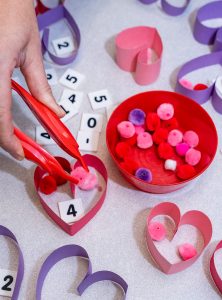
❤️🔢 4. Valentine Math: Counting Hearts
In the math centre, children filled heart containers with pompoms—scooping, sorting, and counting as they worked.
This playful math invitation supported:
- One-to-one correspondence
- Counting and number sense
- Fine motor development
Hands-on math makes numbers feel real, approachable, and fun—exactly how young children learn best.
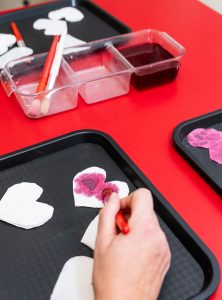
🎨 5. Absorbing Hearts Art Invitation
For art, children explored absorbing hearts using tissue paper, paintbrushes, and red-coloured water. As the colour spread and blended, children watched the magic unfold.
Through this process-based art experience, they practiced:
- Cause and effect observation
- Fine motor control
- Creative exploration without pressure for perfection
Simple materials. Big learning.
💕 Final Thoughts
These Valentine-inspired STEAM activities show how meaningful learning can happen through play, curiosity, and connection. When children are engaged, moving, and exploring, learning feels joyful—and that’s when it sticks.
Want to see these activities in action? CLICK HERE for the full video!
Happy Valentine’s Day—and happy learning! 💗
10 Fun Halloween Learning Activities for Toddlers and Preschool Kids
10 Fun Halloween Learning Activities for Toddlers and Preschool Kids
Halloween is the perfect time to mix play, creativity, and learning — without the sugar rush! Whether you’re a parent at home or an educator in the classroom, these simple, hands-on activities will spark curiosity, fine motor skills, and laughter.
Here are some of my favourite Halloween-themed activities designed with young children in mind. 👻
🧪 1. Spooky Magic Potion
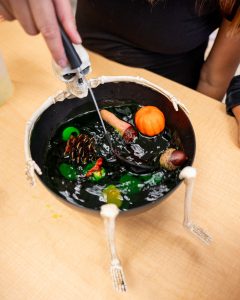
Mix a little science and imagination! Add green slime (coloured water), and a few “creepy” ingredients like plastic spiders, googly eyes, or plastic body parts into a Halloween theme mixing bowl or cauldron. Mix and stir and ask your child to add the “ingredients” to your spooky potion.
Learning Focus: Science exploration, sensory engagement, creativity.
👻 2. Spooky Silhouette Art
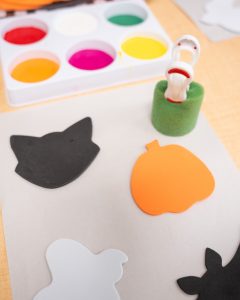
This one’s a Halloween art favorite! Place a paper cutout (like a bat, pumpkin, or ghost) on cardstock and tape it down, then paint over it with sponges or brushes. When you lift the cutout, a magical silhouette appears.
Learning Focus: Fine motor skills, creativity, spatial awareness.
Watch the Video to Learn How HERE!
🧡 3. Pumpkin Spice Play Dough
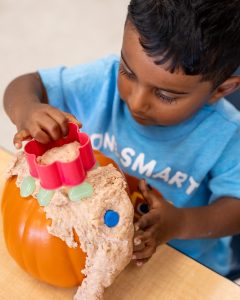
Make your playtime smell amazing! Combine your favorite homemade dough recipe with pumpkin spice and orange coloring. Add cookie cutters, small pumpkins, and rolling pins for endless open-ended play.
Learning Focus: Sensory play, imagination, math and literacy through shape and pattern play.
Watch the Video to Learn How HERE!
🕷️ 4. Monster Math Sensory Bag
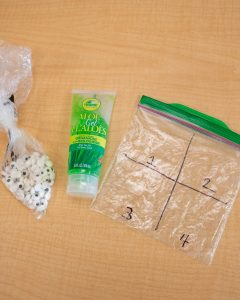
Turn counting and sorting into slimy fun! Fill a zip-top bag with hair gel, googly eyes, and foam numbers or spiders. Tape it to the table and invite your child to squish, move, and match — no mess required!
Learning Focus: Early math, number recognition, sensory processing.
Watch the Video to Learn How HERE!
🧙 5. Orange Salt Letter Tracing
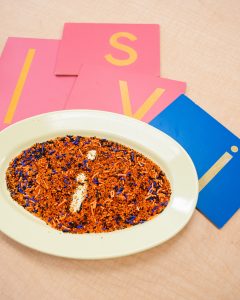
Create a spooky writing tray with orange-dyed salt and letter cards. Kids use their finger or a paintbrush to trace letters — perfect for pre-writing practice.
Learning Focus: Literacy skills, letter formation, fine motor control.
Watch the Video to Learn How HERE!
🕸️ 6. What’s Hiding Under the Cobwebs?
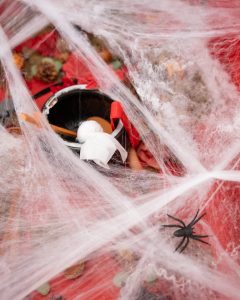
Cover your sensory bin with spider webs to make a spooky sensory bin full of textures, shapes, and surprises! 👻
Add Bats, ghosts, pinecones, tongs and tweezers —lots of sensory fun for little hands. 💛
Learning Focus: Sensory exploration, tactile play, imaginative thinking.
Watch the Video to Learn How HERE!
🎃 7. Halloween Fine Motor Sensory Bin
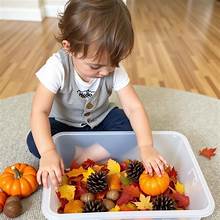
Spooky sensory fun! 👻
Add small pumpkins, leaves, pinecones, spiders, plastic body parts and other themed Halloween items. Add cups, tongs and tweezers. This experience is full of textures, colors, and creepy-cute surprises.
Perfect for toddlers + preschoolers! 🎃
Learning Focus: Sensory exploration, tactile play, Fine motor skills.
🎃 5 Fun Things To Do with a Pumpkin

Pumpkins aren’t just for carving — they’re perfect for hands-on learning and sensory exploration! Here are 5 creative ways to use a pumpkin in your play:
1️⃣ Explore the Seeds and Pumpkin Guts
Let your little one dig right in! Squishy textures, cool temperatures, and slippery seeds make this a full sensory experience.
2️⃣ Make a Pumpkin Sensory Bag (for Younger Infants or Toddlers)
Seal pumpkin parts inside a clear zip-top bag so babies can safely explore without the mess!
3️⃣ Paint the Pumpkin
Use bubble wrap, sponges, or brushes to explore patterns and textures. Encourage creativity with bright colors or glow-in-the-dark paint!
4️⃣ Hammer Tees into the Pumpkin
Give children toy hammers and golf tees to tap into the pumpkin’s surface. A fantastic fine motor workout that’s both fun and safe!
5️⃣ Pumpkin Volcano Experiment
Cut out a Jack-o-lantern. Add baking soda, dish soap, green food coloring, and vinegar to your pumpkin for a bubbling, fizzing surprise. Science + Halloween = magic!
Learning Focus: Sensory exploration, creativity, fine motor skills, and science discovery.
🎨 Wrap-Up
Each of these Halloween activities helps children learn through play, combining fun with meaningful skill development. Whether your child is mixing potions, tracing letters, or exploring pumpkin guts, they’re building brain connections that last long after Halloween night!
💡 Want more step-by-step sensory play guidance?
👉 Explore my mini-course, Sensory Play Made Simple for easy, science-backed ideas you can use all year long!
Fall Sensory Play Ideas for Kids
Fall Sensory Play Ideas for Kids
Fall is the perfect season to bring the magic of sensory play to life. The vibrant colors, cozy scents, and natural textures offer endless opportunities for hands-on learning — and the best part? You can set up these activities with simple, everyday materials you probably already have at home or in your classroom.
Whether you’re a parent, caregiver, or educator, these fun, affordable, and developmentally appropriate ideas will make learning through play a breeze.
Seasonal Sensory Bin Ideas
- Pumpkin Patch Bin 🎃
- What You Need: Dried corn kernels, mini pumpkins, small scoops, cups, and a shallow bin. If you have a child under 3, you can substitute the corn kernels with water, sand or shredded paper.
- How to Play: Children can scoop, pour, and “plant” the pumpkins while practicing fine motor skills.
- Apple Orchard Bin 🍎
- What You Need: Red pom-poms (to represent apples), cinnamon sticks for scent, small baskets, tongs/tweezers and scoops.
- How to Play: Encourage kids to “pick” the apples, count them, and sort them into the baskets.

- Autumn Nature Hunt Bin 🍂
- What You Need: Real or faux leaves, pinecones, acorns, twigs, and magnifying glasses. Add some scoops, tongs/tweezers and plastic containers to sort the items.
- How to Play: Invite children to explore different textures and shapes while talking about colors, sizes, and patterns. Older kids can take on a sorting challenge and sort by colour, size or type of item.
Fall-Themed Sensory Play Recipes
Pumpkin Spice Play Dough ✨
Bring the smell of fall indoors with this cozy, hands-on activity that kids will love.
- What You Need: Flour, salt, cream of tartar, water, oil, orange food coloring, and pumpkin spice.
- How to Play: Roll, squish, and sculpt pumpkins, leaves, or letters for endless fun.
- Bonus: Watch this quick video for the play dough recipe and see how you can make homemade pumpkin spice play dough in just minutes.

Outdoor Sensory Adventures
Don’t forget — sensory play doesn’t have to stay indoors! Here are a few ways to take the learning outside this season:
- Leaf Crunch Walk 🍁
Take a walk and collect fallen leaves. Once you’re back, sort them by size, color, or shape. This simple activity builds vocabulary, observation, and sorting skills — plus, nothing beats the satisfying crunch of stepping on fall leaves.
- Nature Sound Hunt 🎧
Head outside with a simple checklist and invite kids to listen for the sounds of fall — rustling leaves, chirping birds, or the wind blowing through the trees. For younger children, keep it simple with picture prompts; older kids can check off or even draw what they hear.
- Pumpkin Washing Station 💦
Grab a few buckets, fill them with warm water, and add scrub brushes for a simple, engaging cleanup station. Kids will love washing and scrubbing small pumpkins while developing hand strength and coordination.
Mess-Free Sensory Options
Need something quick and cleanup-friendly? Try these simple, no-mess sensory setups:
Fall Sensory Bags 👜
- What You Need: Zip-top bags, water, glitter, leaves, and small seasonal items like faux flowers or mini acorns.
- How to Play: Fill the bag, seal tightly (tape edges for extra security), and secure it to a table or window. Children can squish, press, and explore without any mess.
- Bonus: Watch this quick video to see how you can make a sensory bag in just minutes.
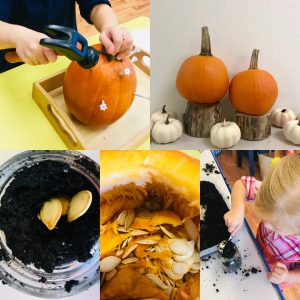
Tip: Want more ideas like this? Get step-by-step guidance in my Sensory Play Made Simple mini-course — perfect for parents and educators looking for easy, play-based learning setups.
Final Thoughts
Fall is such a sensory-rich season — and the perfect time to explore the world through touch, sound, sight, and even smell. Whether you’re setting up a pumpkin patch sensory bin, heading outdoors for a leaf crunch walk, or creating a mess-free sensory bag, each of these activities helps children build important skills while having fun.
Ready to take your sensory play to the next level? Check out my Sensory Play Made Simple mini-course for more easy, affordable, and brain-boosting ideas that you can start using today.
Struggling to Support Your Child’s Learning at Home? Easy Mini-Courses Designed Just for Moms!
Struggling to Educate at Home? Easy Mini-Courses Designed Just for Moms!
I’m so excited to announce a brand-new lineup of mini-courses designed to give you the tools, confidence, and ideas to support early learning—without the overwhelm.
Whether you’re a parent, caregiver, or early childhood educator, these short and practical courses were created with you in mind. No fluff. No pressure. Just real strategies you can use right away.
Why Mini-Courses?
Because you’re busy—and you want quick wins that make a real impact.
Each course is:
✅ Short & focused
✅ Packed with useful, real-world ideas
✅ Designed to fit into your life—not take it over
✅ Budget-friendly and accessible anytime
These aren’t just courses—they’re confidence boosters.
🎉 What’s Inside? Here’s a Look at the Newest Mini-Courses:
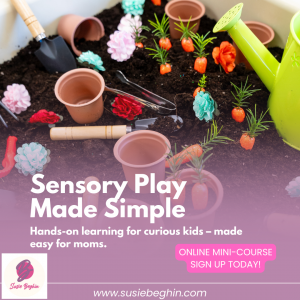
📦 Sensory Play Made Simple
Hands-on learning for curious kids – made easy for moms.
Curious about sensory play but not sure where to start? You’re not alone—and this course is here to guide you.
You’ll learn:
- Why sensory play supports brain, body, and emotional development
- How sensory activities build focus, language, and motor skills
- How to create fun setups in under 10 minutes
- How to adapt activities for different ages, needs, and styles
Walk away feeling inspired and equipped to create powerful play experiences—using what you already have at home.
Click here to sign up.
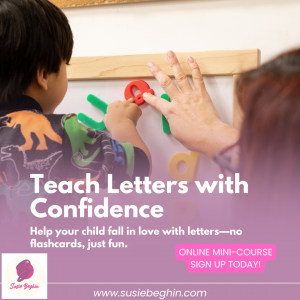
🔤 Teach Letters with Confidence
Help your child fall in love with letters—no flashcards, just fun.
Forget the drills and pressure. This course helps you teach early literacy through joy, connection, and hands-on play.
You’ll learn:
- How letter learning really works
- Playful strategies that build confidence
- Ways to make letters part of everyday moments
Perfect for parents and caregivers who want to make early reading feel natural, not forced.
Click here to sign up.

🧠 Unlock the Secrets to How Children Learn
Learn how to nurture curiosity, creativity, and confidence at home.
This course dives into the brain science of how young children actually learn—through play, connection, and curiosity.
You’ll learn:
- Why curiosity is your child’s best learning tool
- How play outperforms repetition and drills
- How to turn everyday moments into meaningful learning
Ideal for parents, educators, and anyone who wants to support learning without stress.
Click here to sign up.
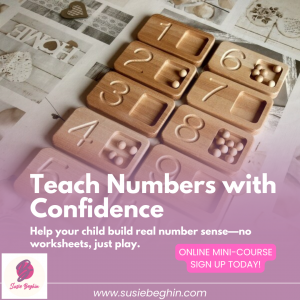
🔢 Teach Numbers with Confidence
Help your child build real number sense—no worksheets, just play.
If you’re unsure how to teach early math in a way that actually sticks, this course is for you.
You’ll learn:
- What number sense looks like in early childhood
- How to introduce counting, quantity, and number recognition
- Simple games and strategies to teach math through play
Great for educators and parents who want to ditch the flashcards and teach math the way kids learn best.
Click here to sign up.
🎓 Ready to Learn, Grow, and Play?
These mini-courses are designed to meet you right where you are—with real-world tools you can use the same day.
Whether you’re looking for fresh ideas or a little reassurance, I’ve got you.
👉 Explore the courses now. Click here to sign up.
Start anytime. Learn at your pace. Keep access for good.
Let’s make learning joyful again—because when adults feel confident, kids thrive.
Transforming the Outdoors into a Classroom: Learning Beyond the Walls
Transforming the Outdoors into a Classroom: Learning Beyond the Walls
“There’s no Wi-Fi in the forest, but you’ll find a better connection.”
In early childhood education, we often talk about environments as the third teacher—and the great outdoors is one of the most powerful and overlooked classrooms of all.
When you step outside, learning becomes multi-sensory, meaningful, and full of real-world connections. Here’s how you can create rich educational experiences outdoors using four key learning zones: art, physical activity, sensory play, and literacy.

🎨 Outdoor Art: Nature as the Canvas
Art outside isn’t just about painting under the sun—it’s about using nature itself as the medium. Set up an outdoor art station with clipboards, natural paintbrushes (sticks, pine branches, leaves), and washable paints. Children can draw what they see, mix colors with mud, or create land art using stones, twigs, and petals.
Why it matters:
Outdoor art fosters creativity, fine motor skills, and encourages children to observe and appreciate their surroundings. It’s process-focused, messy, and completely magical.
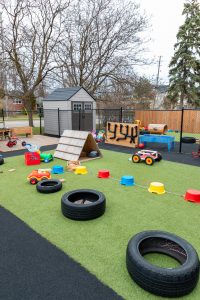
🏃♀️ Physical Activity: Learning Through Movement
Gross motor development is foundational in early childhood, and your outdoor space is the perfect arena for movement. Set up an obstacle course with logs, balance beams, tires, and tunnels. Let kids run, jump, climb, and crawl.
Why it matters:
Physical activity supports coordination, balance, spatial awareness, and builds confidence. And when children move their bodies, they’re also strengthening their brains.
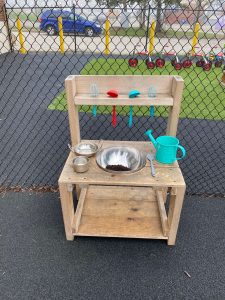
🧼 Sensory Play: Engaging the Whole Body
Think mud kitchens, water tables, sand pits, and bins filled with leaves or pinecones. Sensory play outdoors allows for bigger messes and bigger discoveries. In our outdoor classroom, our mud kitchen is always busy—stirring, pouring, and inventing recipes and potions using mud, sticks and stones.
Why it matters:
Sensory play promotes exploration, early science concepts, and language development. It also supports emotional regulation and collaborative play.
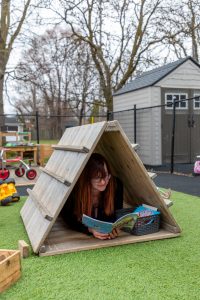
📚 Literacy: Reading and Storytelling Under the Sky
Books don’t belong only inside. Set up a cozy tent or shady nook with pillows and a bin of books. Children can listen to stories, flip through picture books, or even act them out using props they find in nature.
Why it matters:
Outdoor reading connects literacy to the real world. When a child reads about a bird and then spots one overhead, comprehension becomes real. Language and storytelling blossom when children are surrounded by inspiration.
Final Thoughts
An outdoor classroom isn’t just a trend—it’s a return to what children need: space, fresh air, and natural curiosity. By thoughtfully including areas for art, physical activity, sensory play, and literacy, you’re creating a whole-child learning experience that goes far beyond worksheets and screens.
Let the outdoors be your co-teacher—because real learning doesn’t always happen at a desk.
A Guide to Gardening with Kids: Growing More Than Just Plants!
A Guide to Gardening with Kids: Growing More Than Just Plants!
If you’ve ever handed a toddler a watering can, you know the magic that happens when kids get their hands in the dirt. Gardening isn’t just about growing veggies or pretty flowers—it’s about growing curious minds, responsible little humans, and hands-on learners.

Why Garden with Kids?
Gardening offers powerful learning moments that offer hands-on inquiry, discovery, and STEAM exploration. Here’s what kids really get when they garden:
🧠 Science Smarts
From seed to sprout, kids learn about lifecycles, weather, insects, and ecosystems—STEAM learning in real life!
💪 Fine & Gross Motor Skills
Digging, scooping, and planting help build coordination and strength.
❤️ Responsibility & Patience
Caring for a plant teaches kids that growth takes time, effort, and a whole lot of love.
😌 Mindfulness & Sensory Play
Gardening is calming and full of rich sensory experiences—from soft petals to the squish of soil.
Easy Gardening Ideas for Kids
You don’t need a backyard or fancy tools to start! Try these:
🌼 Container Garden
Plant herbs or flowers in a small container with a little soil. Place it on a sunny windowsill and watch the magic begin.
🥕 Root Veggie Re-Grow
Use kitchen scraps like carrot tops or green onions in shallow water and watch them regrow.
🪴 Gardening Sensory Bin: Dig Into Discovery!
Not quite ready for a full garden? Create a Gardening Sensory Bin that brings the outdoors in—perfect for toddlers and preschoolers!
What You’ll Need:
- A shallow bin or container
- Soil (avoid potting soil with fertilizer unless you plan to use gloves)
- Small faux or real flowers
- Mini gardening tools or spoons
- Toy bugs, worms, and seeds
- Small pots or cups
- Water spray bottle and/or watering can
How to Play:
Let your child dig, plant, scoop, and explore. Encourage pretend play like planting flowers, watering them, or finding worms in the soil. Ask open-ended questions:
💬 “What do you think this bug eats?”
💬 “How can we help this flower grow?”
Why It’s Great:
This bin is loaded with sensory play, language development, fine motor practice, and imaginative exploration—all wrapped up in one fun activity.
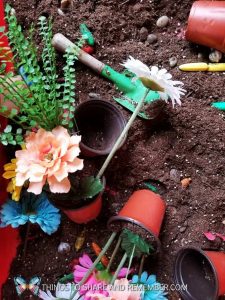
Tips for a Successful Garden Experience
- Let kids take the lead—even if it gets messy. It’s their garden too!
- Talk about what you’re doing and ask questions: “What do you think this seed needs to grow?”
- Celebrate small wins: “Look! A sprout!”
Final Thought
Gardening with kids isn’t just an activity—it’s a moment of connection, a spark of wonder, and a hands-on way to raise curious, confident little learners. Whether you’re growing basil in a jar or digging up potatoes in the backyard, you’re planting seeds of learning and love.
April Showers Bring May Flowers: Rainy Day Play Ideas for Toddlers
April Showers Bring May Flowers: Rainy Day Activity Ideas for Toddlers
April’s rainy days don’t have to mean boredom for your little ones! While the wet weather may keep you indoors, it also provides the perfect opportunity to engage in fun and educational activities with your toddler. Here are some playful and enriching ways to make the most of rainy days while supporting your child’s learning and development.
- Indoor Obstacle Course 🏃♀️
Turn your living room into an exciting adventure course! Use pillows, chairs, cardboard boxes, and blankets to create a safe obstacle path. Crawling through boxes, jumping over cushions, and balancing on a tape line can enhance gross motor skills and coordination while keeping toddlers active indoors.
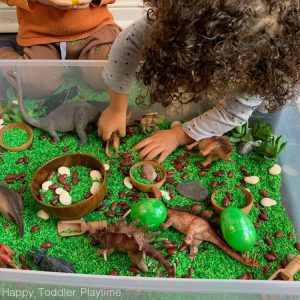
- Sensory Bin Fun 🌈
Bring a little bit of nature inside with a rainy-day sensory bin. Fill a plastic container with items like water beads, rice, or kinetic sand and add toy animals, measuring cups, and scoops for hands-on exploration. Sensory play helps with fine motor skills and cognitive development, while also providing a calming experience.
- DIY Rain Art 🎨
Take advantage of the rain by creating a fun science-meets-art activity! Let your child color on coffee filters with washable markers, then place them outside in the rain for a few moments to watch the colors blend and swirl. Once dry, you’ll have a beautiful, one-of-a-kind piece of art to display.

- Storytime Fort 📚
Build a cozy reading nook using blankets and pillows, then snuggle up for a storytelling session. Choose books with a rainy-day theme, such as The Rainy Day by Anna Milbourne or Raindrop, Plop! by Wendy Cheyette Lewison. Storytime helps build language skills, comprehension, and imagination.
- Bake Together 🍪
Turn your kitchen into a mini baking studio! Simple recipes like banana muffins or homemade granola bars offer a fun and tasty way to teach early math and science skills through measuring, mixing, and pouring. Plus, baking together encourages patience and following instructions.
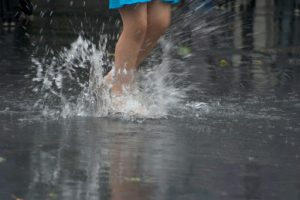
- Puddle Play (With Proper Gear!) ☔
If the rain isn’t too heavy and it’s safe to go outside, embrace the weather! Dress your little one in rain boots and a waterproof jacket, then go outside for some good old-fashioned puddle jumping. This activity strengthens motor skills and allows for a fun sensory experience while enjoying nature’s wonders.
- Indoor Picnic 🧺
Bring the fun of an outdoor picnic inside! Lay out a blanket in your living room and enjoy lunch in a new setting. Pretend play like this fosters creativity and imagination while making mealtime more exciting.
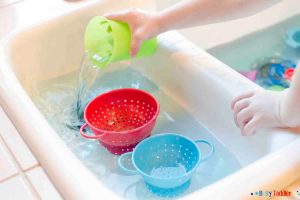
- Water Play in the Sink 💦
If your child loves playing with water, set up a “kitchen sink ocean.” Fill the sink with warm water, add some floating toys, cups, or a small colander, and let them explore pouring and splashing. Water play is a great way to encourage problem-solving and sensory exploration.
Final Thoughts 🌟
Rainy days don’t have to be dreary! With a little creativity, they can become magical opportunities for exploration, discovery, and connection. Whether you’re jumping in puddles, baking together, or enjoying a cozy book nook, these activities will keep your toddler engaged, learning, and having fun—rain or shine!
Follow Susie Beghin on Instagram or visit her website for more activity Ideas.
About the Author
Susie Beghin – Early Childhood Education Expert & Creator of the Raising Bright Early Learners System
Susie Beghin is a Registered Early Childhood Educator (RECE), author, and early childhood education thought leader dedicated to helping parents and educators give young children the best start in life. As the founder of the Raising Bright Early Learners System, Susie has developed a comprehensive program designed to empower stay-at-home moms and caregivers with the tools and confidence to provide high-quality early learning experiences at home.
With 20+ years of experience as a daycare owner and Founder of Alpha’s Discovery Kids Preschool and Daycare, and mom of a child with ADHD/autism, Susie understands the challenges parents face when it comes to early childhood education. Her expertise in STEAM-based learning, play-based education, and child development has allowed her to create a system that is both accessible and impactful for parents looking to nurture their child’s curiosity and cognitive growth.
Through her book, Parents Learn to Play Too, her popular ECE Classroom podcast, and hands-on training programs, Susie bridges the gap between professional early childhood education and practical, everyday parenting. The Raising Bright Early Learners System is built on the principles of inquiry, discovery, and exploration, helping parents create engaging learning environments that spark a lifelong love of learning in their children.
Whether through social media content, workshops, or personalized coaching, Susie is committed to making early learning simple, fun, and effective for families everywhere. Join her mission to raise bright early learners and feel confident in your child’s learning journey from the very start!
4 Easy Spring Sensory Play Ideas for Toddlers and Preschoolers
4 Easy Spring Sensory Play Ideas for Toddlers and Preschoolers
by Susie Beghin
Spring is a magical time for young children. The world is waking up, flowers are blooming, and new life is sprouting everywhere. It’s the perfect season to engage kids in sensory play — helping them explore the world through touch, smell, sight, sound, and even taste! Sensory play encourages discovery and inquiry, building essential skills like fine motor development, problem-solving, and language growth.
In this blog, I’ll share some fun and easy spring sensory play ideas, including creative gardening activities to get your little ones excited about the season.

🌱 1. Planting and Gardening Sensory Bins
Gardening is one of the best hands-on sensory experiences for kids. The feel of soil between their fingers, the smell of fresh herbs, and the sight of tiny green shoots create a rich sensory experience.
What You’ll Need:
- A shallow bin or tray (or sensory bin)
- Potting soil
- Small plastic pots
- Small gardening tools (like a spade or trowel)
- Seeds (like beans, sunflowers, or herbs)
- Small flowers
- Watering Can
How to Do It:
- Fill the bin with soil and let your child dig and explore.
- Encourage them to plant seeds and cover them with soil.
- Let them use a spray bottle to water the seeds.
- Observe how the seeds begin to sprout over the next few days.
Learning Boost: Talk about what plants need to grow (sunlight, water, soil) and introduce simple science terms like “germination.”
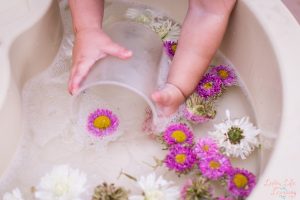
🌸 2. Flower Petal Sensory Soup
This colorful activity combines touch, sight, and smell for a multi-sensory experience.
What You’ll Need:
- A shallow bin, bowl or tray (or sensory bin)
- Water
- Flower petals (real or fake)
- Spoons, ladles, and small cups
How to Do It:
- Fill the bowl with water and add the flower petals.
- Let your child stir, scoop, and pour the “soup.”
- Encourage them to describe how the petals feel and smell.
Learning Boost: Introduce color names and texture words like “soft,” “smooth,” and “fragrant.”

🌼 3. Mud Kitchen
Let your child engage in messy play by creating a “mud kitchen” outdoors.
What You’ll Need:
- Dirt
- Water
- Old pots, pans, and kitchen utensils
- Leaves, grass, and flowers
How to Do It:
- Set up an outdoor play area with mud and kitchen tools.
- Encourage your child to mix mud “recipes” using leaves and flowers.
- Let them squish, mold, and pour the mud to create different textures.
Learning Boost: Discuss the difference between wet and dry mud and how adding water changes the texture.
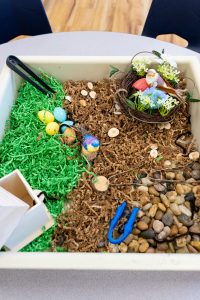
🦋 4. Birds Exploration
Spring is a busy time for birds as they make their nests! Encourage kids to observe and explore these creatures and then create a bird sensory exploration indoors.
What You’ll Need:
- Shredded paper (green and brown)
- Bird’s nest and or bird house (you can make the nest or house as a craft activity with pieces of twigs or buy it from the dollar store)
- Toy birds
- Small toy eggs (plastic)
- Feathers
- Wood pieces (twigs and small wood cutouts)
- Brown yarn cut in small pieces (worms)
- Tweezers
How to Do It:
- Arrange a combination of green and brown paper on the bottom of the bin. Place the house and nest in the bin.
- Scatter the yarn worms around the paper and hide some underneath the “grass”.
- Place the eggs in the nest as well as the birds.
- Encourage your child “feed” the birds by using the tweezers to pickup the worms and feed them to the birds.
- Encourage open-ended play with your bird habitat.
Learning Boost: Discuss how birds make nests and take care of their young.
🌷 Why Sensory Play Matters
Spring sensory play helps children develop:
✅ Fine motor skills (through digging, pouring, and stirring)
✅ Language skills (by describing textures and smells)
✅ Cognitive growth (by observing plant growth and understanding natural cycles)
✅ Emotional regulation (sensory play is calming and helps reduce stress)
Spring is the perfect time to encourage discovery and exploration through sensory play. These simple but meaningful activities will spark your child’s natural curiosity and help them connect with the world around them.
For more ideas like this, visit YouTube !
7 Valentine’s Day-Themed Activities for Preschoolers
Love, Learning, and Little Hands: 7 Valentine’s Day-Themed Activities for Preschoolers
February is the perfect time to blend love and learning with engaging, hands-on activities. Learning through play fosters curiosity, creativity, and confidence in young children. This blog will explore STEAM, fine motor, sensory, literacy, and math activities—all with a Valentine’s Day twist!
STEAM Exploration: Science

1. Fizzing Heart Science
- Materials: Baking soda, water, vinegar, heart-shaped cookie cutters, food coloring
- Exploration: Mix baking soda with pink/red colored water, shape it into hearts using the cookie cutter. Let it dry and then drop it on a plate of vinegar and watch it fizz!
- Learning: Introduces simple chemical reactions and cause-and-effect.
2. Floating Hearts – A Surface Tension Experiment
- Materials: Dry-erase markers, white ceramic plate, water, straw or spoon
- Exploration: Draw small hearts on the plate with a dry-erase marker. Slowly pour a small amount of water onto the plate. Watch as the hearts lift off and float! Use a straw or spoon to gently move them around.
- Learning: Introduces kids to surface tension and water resistance. Encourages observation and prediction in a fun, hands-on way.
Fine Motor Fun: Strengthening Little Hands

3. Heart Threading Garland
- Materials: Yarn, hole-punched paper hearts, plastic needle
- Exploration: Encourage kids to thread paper hearts onto yarn to create a festive garland.
- Learning: Develops hand-eye coordination and fine motor control.
4. Valentine’s Day Playdough Invitation
- Materials: Pink/red playdough, heart-shaped cookie cutters, buttons, beads
- Exploration: Let kids press, roll, and shape the dough into fun Valentine’s-themed designs.
- Learning: Supports creativity and strengthens finger muscles for pre-writing skills.
Sensory Play: Engaging the Senses
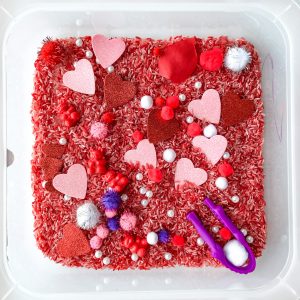
5. Valentine’s Sensory Bin
- Materials: Dyed rice (red/pink) or pink/red shredded paper, heart-shaped objects, foam hearts, scoops, small containers
- Exploration: Let kids scoop, pour, and sort items in the bin.
- Learning: Encourages sensory exploration, sorting, and fine motor skills.
Literacy and Math Exploration
6. Heart Letter-Matching Game
- Materials: Paper or foam hearts with uppercase and lowercase letters
- Exploration: Cut hearts in half with one side having the uppercase letter and the other half with the matching lowercase letter. Kids match uppercase and lowercase letters to complete the heart.
- Learning: Reinforces letter recognition and early literacy.
7. Counting Hearts Game
- Materials: Paper hearts with numbers, small manipulatives (pom-poms, beads)
- Exploration: Children place the correct number of manipulatives on each numbered heart.
- Learning: Develops number sense and one-to-one correspondence.
Incorporating Valentine’s Day into learning offers a great opportunity to foster inquiry, discovery, and exploration at home. These activities make learning fun and meaningful while strengthening early childhood skills. This is a great way to embrace playful learning and enjoy quality time with your little ones.
Winter Activities for Kids: 10 Fun Ways to Explore, Discover, and Learn This Season
Winter Activities for Kids: 10 Fun Ways to Explore, Discover, and Learn This Season
Winter is a magical time for kids, with snowflakes swirling, frost on windows, and a chill in the air. But it can also be a challenging time for parents and caregivers in cold climates, as kids are often cooped up indoors. However, winter offers endless opportunities for fun, exploration, and learning—both indoors and outdoors. Here are 10 engaging winter activities that encourage inquiry, discovery, and creativity.
Outdoor Winter Activities
- Snow Painting Bring out your child’s inner artist by filling spray bottles with colored water (just a few drops of food coloring mixed with water) and letting them paint the snow. This activity is not only fun but also encourages creativity and fine motor skills.
- Frozen Nature Hunt Head outside with a basket and search for natural items like pinecones, twigs, and leaves. Bring them home and place them in a shallow tray filled with water. Leave the tray outside to freeze overnight, creating a nature-themed ice sculpture. This is a great way to spark curiosity about the changing seasons. Take out a small hammer and a spray bottle with warm water and have your child try to get the items out of the ice!
- Bird Feeder Craft Make a simple bird feeder using pinecones, peanut butter, and birdseed. Hang the feeders outside and watch as winter birds come to visit. This activity promotes an interest in wildlife and nature.
Indoor Winter Activities
- DIY Snow Globes Help your child make their own snow globe using a clear jar, water, glitter, and small figurines. This craft activity enhances creativity while also teaching basic science concepts about liquids and solids.
- Snowflake Symmetry Art Cut out paper snowflakes and use them to teach kids about symmetry. Once the snowflakes are cut, let them decorate each half with different colors or patterns to highlight their symmetrical design.
- Winter-Themed Story Time Cozy up with a blanket and read winter-themed books together. Follow up the reading session with a creative storytelling activity where kids make up their own winter adventure. Storytelling helps develop language skills and imagination.
Sensory Winter Play
- Indoor Snow Play Bring the snow indoors by filling a large bin with clean snow. Add small toys, scoops, and containers for sensory play. If you don’t have snow, you can create fake snow using baking soda and water and freeze it until it is the consistency of snow.
- Frozen Treasure Hunt Freeze small toys or objects in a block of ice, then let your child “excavate” them using warm water, droppers, and small tools. This is a fun way to build fine motor skills and introduce basic science concepts like melting and temperature.
- Winter Sensory Bin Create a sensory bin with cotton balls, white pom-poms, and small winter-themed toys. Add scoops, tongs, and containers for kids to explore textures and practice their fine motor skills.
Winter STEM Challenges
- Marshmallow Igloo Building Provide mini marshmallows and toothpicks for kids to construct their own igloos. This hands-on activity encourages engineering skills and spatial thinking.
Winter is a season full of possibilities for learning through play. By encouraging kids to explore the world around them—even when it’s cold outside—you nurture their natural curiosity and creativity. Whether it’s experimenting with snow, exploring nature or crafting unique snowflakes, these activities create lasting memories while supporting your child’s development.
So bundle up, gather some supplies, and let the winter fun begin!
For more winter activities, subscribe to Susie Beghin’s YouTube channel or follow on Instagram or Facebook.

